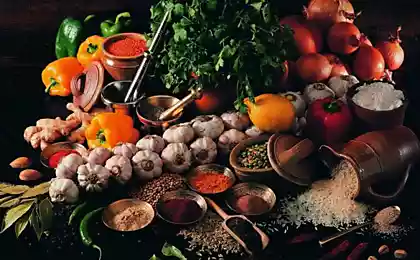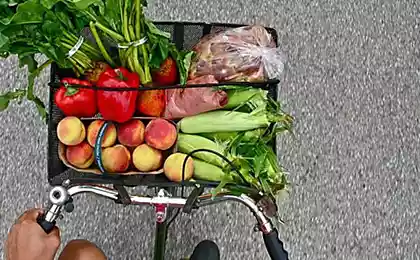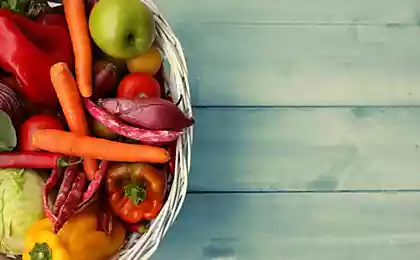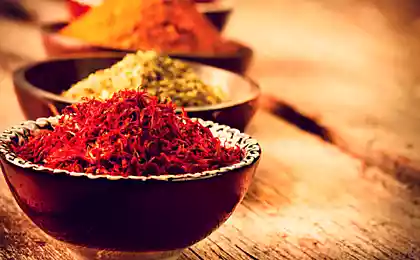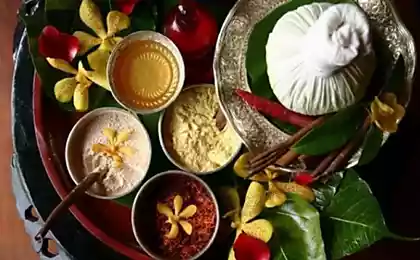593
Ayurveda — how much should you eat
Sixty nine million one hundred fifty seven thousand ninety
That's what they say about eating in the "Hridaya Ashtanga Samhita", Chapter 8 "Matsushita adhyaya" (determination of the proper amount of food), with comments by Dr. Vetrov. Excerpts only for the power, without the names of diseases that improper diet:
1-2. A person should always consume proper quantity of food, the properties of which properly stimulate Agni (digestive fire). Regardless of whether the food is easily digestible or difficult digestible for normal digestion, it in any case, you need to only take in a certain amount.
3.The consumption of insufficient quantity of food does not provide strength, growth and energy and becomes the cause of all diseases related to Vata dosha. On the other hand, her excessive amount causes a rapid imbalance of all three doshas.
Comment:
From the point of view of Ayurveda, the number and nature of food intake should match the type of Constitution of man, his age, season, lunar cycle, time of day, psychological status and possible pathology of the body. Measure food intake is the number, which is easily and quickly digested.
People with Vata Constitution should not take large volumes of food, especially heavy, as they have enzymes of the digestive tract and anabolic hormones are produced in small quantities.
However, since the transfer speed of the bolus from one part of the gastrointestinal tract to another is quite high, they need to eat 4 times a day. For large breaks in the meal, they have anti-peristaltic of the large intestine leading to the emergence of spastic constipation.
The appetite of people with Vata Constitution is very fragile and heavily dependent on psycho-emotional state. Therefore, Ayurveda recommends to eat at certain times, but only when there is hunger. In the 3rd lunar phase they should to eat more dairy products and fluids.
People with Pitta Constitution should be eating at certain times, as they more than others are dependent on diurnal rhythms. After reaching a certain diet, they should be strictly adhered to. The digestive power of such people is very great (they often say, "Their stomach can digest even nails").
However, if they regularly eat at certain times, all enzymes and hormones are produced from them in sufficient quantity. But if they miss mealtimes, they usually have a bad mood.
People with Pitta Constitution enough to eat three times a day. It is not recommended to do it at sunrise, sunset, noon and midnight, as at this time their neuroendocrine system adjusts to certain cosmic rhythms.
In the evening they should not use a large amount of animal fats and simple carbohydrates (sugar, wheat and corn products, potatoes, bananas and grapes), as their liver is able at this time to synthesize the enormous amount of cholesterol. In the 1st and 3rd of the lunar phase it is especially strictly to adhere to the rules of nutrition. Improper diet may cause these people the liver disease, peptic ulcer disease, and atherosclerosis.
People with Kapha Constitution can eat 1-2 times a day, avoiding simple carbohydrates and a large amount of animal food, as they are due to the high activity they of the hormone insulin prone to being overweight. They should be in the 2 nd lunar phase to take mainly fruits, berries and vegetables. In the 4th phase it is recommended to limit fermentation, pickles, and marinades.
In winter you can eat a lot in the summer – small, spring and autumn is temperate.
As a child you should use a wide the diet products when you often, in middle age – to strictly adhere to dietary recommendations, relevant to its type of Constitution, the elderly should eat the way prescribed for men wool, regardless of the type of Constitution (end of review)
4-5. In a person who does not hold itself (can't control his need for food), Vata and other doshas, suddenly all together excited and being associated with undigested and spoiled food, causing disruption of the movement of food in the digestive tract removing undigested food through the top and bottom (the appearance of vomiting and diarrhea) at the same time.
12. Greatly increased doshas, getting in spoiled and soiled (by accumulation of undigested food) channels, you lose the ability to walk on him and start moving on to other (unnatural) channels, making the entire body rigid, like a log. This disease can hardly be cured because it rapidly causes death.
13-14. Addicts incongruous products, peredayuschiy and using unprepared foods, become the victim of a terrible disease Amadora, which is like poison and is therefore called amavisca (poisoning food). It also is not subject to cure because of its similarity with poison (deadly) speed of action, and require treatment means having opposite qualities.
Comment:
Described in pathological syndromes associated with the violation of rules of power according to its type of Constitution, age, seasonal and circadian rhythms.
Food compatibility rules must be strictly adhered to for the elderly and people with Vata Constitution, because of the weakness of their digestive fire.
A separate food recommended by the famous American nutritionists Shelton and Brigham absolutely not suitable for children and people with Kapha Constitution. Moreover, it may even damage them. The consequence of this type of diet are obesity and diabetes mellitus type II. (end of comment).
15-16. AMA (undigested food), stale inside, should be quickly removed... (in different ways)
31-32. Education AMA is not only food, consumed in large quantities. This also occurs when eating food that does not like food that causes flatulence, too overcooked or overcooked food, or raw, difficult digestible, too dry, very cold, contaminated, causing heartburn, dry or watery. The same applies to the food, which is made by a person, weary sadness, frequent rage or prolonged hunger.
33-34. The use of suitable and unsuitable foods mixed together is known samaana; eating lots of good food before the previous food is digested, called adhaan; eating more or less food at the wrong time is wisemachine. All of this could become or cause death, or cause dangerous diseases.
35-38. Should eat food at the right time; she should be accustomed, clean, suited to health, unctuous, hot and easily digestible. Eating the food with care, use all six tastes with predominance of sweet, not to eat too quickly or too slowly.
39. To be rejected...... re-heated food with a predominance of vegetables and poorly digested
46.Two parts of the stomach (half of its capacity) to be filled up with solid food, one part by liquids and the remaining part should be left free for air.
54.If a person is suffering from edema, polyuria (diabetes), sores, diseases of the eyes and throat, he should avoid the use of fluids (after meals).
Immediately after a meal (healthy and sick) people should not talk a lot, a long walk, to sleep immediately after intake of fluids, to stay in the sun or near a fire, walk to transport, to swim and to ride a horse.
Comment:
Ayurveda recommends immediately after a meal to lie down on your left side (15-20 minutes), then 5-10 min on the right. You can then take anupana (liquid improves digestion, different in different States). This will allow the adopted diet best digested and absorbed.
People suffering from edema due to heart and kidney failure or diabetes type II (insulin) and glaucoma should not take anupana and a large number of liquids throughout the day.
55. Perfect time for a meal – after his release from feces and urine, when the mind is purified (freed of emotions) when doshas move naturally (functioning normally), when belching is pure (without bad smell or taste), with significant hunger, when gases easily come out the bottom way, digestive activity is strong, the senses are clean and the body is light. Food should be taken, respecting the rules and the ways of its use. This is the best time.
Comment:
Some people think that a person needs a bowel movement after each meal. However, in the section of Rasayana is given a different point of view: "He who defecate immediately after a meal, brings their old age and death." In addition, it is normal if a man empties his bowels only 1 time in the morning. A different regime can be considered as different forms of disorders of the gastrointestinal tract.
(Thus ends the Chapter called Matralia, the eighth Chapter is Strackany included in Asthangahridaya-Samhita, authored the Srimad Vagbhata, son of Sri Vidyapati Simhapuri).
"Ashtanga Hridaya Samhita" (500-600 ad), an ancient text on Ayurveda on healthy lifestyle, prevention and treatment of diseases, cleanse the body, to preserve youth and delay old age.
Author: Sri Vagbhata his work to our time is the universal textbook of Ayurvedic medicine.
Source: aayurveda.ca/diet/how-much-eat/3/
That's what they say about eating in the "Hridaya Ashtanga Samhita", Chapter 8 "Matsushita adhyaya" (determination of the proper amount of food), with comments by Dr. Vetrov. Excerpts only for the power, without the names of diseases that improper diet:
1-2. A person should always consume proper quantity of food, the properties of which properly stimulate Agni (digestive fire). Regardless of whether the food is easily digestible or difficult digestible for normal digestion, it in any case, you need to only take in a certain amount.
3.The consumption of insufficient quantity of food does not provide strength, growth and energy and becomes the cause of all diseases related to Vata dosha. On the other hand, her excessive amount causes a rapid imbalance of all three doshas.
Comment:
From the point of view of Ayurveda, the number and nature of food intake should match the type of Constitution of man, his age, season, lunar cycle, time of day, psychological status and possible pathology of the body. Measure food intake is the number, which is easily and quickly digested.
People with Vata Constitution should not take large volumes of food, especially heavy, as they have enzymes of the digestive tract and anabolic hormones are produced in small quantities.
However, since the transfer speed of the bolus from one part of the gastrointestinal tract to another is quite high, they need to eat 4 times a day. For large breaks in the meal, they have anti-peristaltic of the large intestine leading to the emergence of spastic constipation.
The appetite of people with Vata Constitution is very fragile and heavily dependent on psycho-emotional state. Therefore, Ayurveda recommends to eat at certain times, but only when there is hunger. In the 3rd lunar phase they should to eat more dairy products and fluids.
People with Pitta Constitution should be eating at certain times, as they more than others are dependent on diurnal rhythms. After reaching a certain diet, they should be strictly adhered to. The digestive power of such people is very great (they often say, "Their stomach can digest even nails").
However, if they regularly eat at certain times, all enzymes and hormones are produced from them in sufficient quantity. But if they miss mealtimes, they usually have a bad mood.
People with Pitta Constitution enough to eat three times a day. It is not recommended to do it at sunrise, sunset, noon and midnight, as at this time their neuroendocrine system adjusts to certain cosmic rhythms.
In the evening they should not use a large amount of animal fats and simple carbohydrates (sugar, wheat and corn products, potatoes, bananas and grapes), as their liver is able at this time to synthesize the enormous amount of cholesterol. In the 1st and 3rd of the lunar phase it is especially strictly to adhere to the rules of nutrition. Improper diet may cause these people the liver disease, peptic ulcer disease, and atherosclerosis.
People with Kapha Constitution can eat 1-2 times a day, avoiding simple carbohydrates and a large amount of animal food, as they are due to the high activity they of the hormone insulin prone to being overweight. They should be in the 2 nd lunar phase to take mainly fruits, berries and vegetables. In the 4th phase it is recommended to limit fermentation, pickles, and marinades.
In winter you can eat a lot in the summer – small, spring and autumn is temperate.
As a child you should use a wide the diet products when you often, in middle age – to strictly adhere to dietary recommendations, relevant to its type of Constitution, the elderly should eat the way prescribed for men wool, regardless of the type of Constitution (end of review)
4-5. In a person who does not hold itself (can't control his need for food), Vata and other doshas, suddenly all together excited and being associated with undigested and spoiled food, causing disruption of the movement of food in the digestive tract removing undigested food through the top and bottom (the appearance of vomiting and diarrhea) at the same time.
12. Greatly increased doshas, getting in spoiled and soiled (by accumulation of undigested food) channels, you lose the ability to walk on him and start moving on to other (unnatural) channels, making the entire body rigid, like a log. This disease can hardly be cured because it rapidly causes death.
13-14. Addicts incongruous products, peredayuschiy and using unprepared foods, become the victim of a terrible disease Amadora, which is like poison and is therefore called amavisca (poisoning food). It also is not subject to cure because of its similarity with poison (deadly) speed of action, and require treatment means having opposite qualities.
Comment:
Described in pathological syndromes associated with the violation of rules of power according to its type of Constitution, age, seasonal and circadian rhythms.
Food compatibility rules must be strictly adhered to for the elderly and people with Vata Constitution, because of the weakness of their digestive fire.
A separate food recommended by the famous American nutritionists Shelton and Brigham absolutely not suitable for children and people with Kapha Constitution. Moreover, it may even damage them. The consequence of this type of diet are obesity and diabetes mellitus type II. (end of comment).
15-16. AMA (undigested food), stale inside, should be quickly removed... (in different ways)
31-32. Education AMA is not only food, consumed in large quantities. This also occurs when eating food that does not like food that causes flatulence, too overcooked or overcooked food, or raw, difficult digestible, too dry, very cold, contaminated, causing heartburn, dry or watery. The same applies to the food, which is made by a person, weary sadness, frequent rage or prolonged hunger.
33-34. The use of suitable and unsuitable foods mixed together is known samaana; eating lots of good food before the previous food is digested, called adhaan; eating more or less food at the wrong time is wisemachine. All of this could become or cause death, or cause dangerous diseases.
35-38. Should eat food at the right time; she should be accustomed, clean, suited to health, unctuous, hot and easily digestible. Eating the food with care, use all six tastes with predominance of sweet, not to eat too quickly or too slowly.
39. To be rejected...... re-heated food with a predominance of vegetables and poorly digested
46.Two parts of the stomach (half of its capacity) to be filled up with solid food, one part by liquids and the remaining part should be left free for air.
54.If a person is suffering from edema, polyuria (diabetes), sores, diseases of the eyes and throat, he should avoid the use of fluids (after meals).
Immediately after a meal (healthy and sick) people should not talk a lot, a long walk, to sleep immediately after intake of fluids, to stay in the sun or near a fire, walk to transport, to swim and to ride a horse.
Comment:
Ayurveda recommends immediately after a meal to lie down on your left side (15-20 minutes), then 5-10 min on the right. You can then take anupana (liquid improves digestion, different in different States). This will allow the adopted diet best digested and absorbed.
People suffering from edema due to heart and kidney failure or diabetes type II (insulin) and glaucoma should not take anupana and a large number of liquids throughout the day.
55. Perfect time for a meal – after his release from feces and urine, when the mind is purified (freed of emotions) when doshas move naturally (functioning normally), when belching is pure (without bad smell or taste), with significant hunger, when gases easily come out the bottom way, digestive activity is strong, the senses are clean and the body is light. Food should be taken, respecting the rules and the ways of its use. This is the best time.
Comment:
Some people think that a person needs a bowel movement after each meal. However, in the section of Rasayana is given a different point of view: "He who defecate immediately after a meal, brings their old age and death." In addition, it is normal if a man empties his bowels only 1 time in the morning. A different regime can be considered as different forms of disorders of the gastrointestinal tract.
(Thus ends the Chapter called Matralia, the eighth Chapter is Strackany included in Asthangahridaya-Samhita, authored the Srimad Vagbhata, son of Sri Vidyapati Simhapuri).
"Ashtanga Hridaya Samhita" (500-600 ad), an ancient text on Ayurveda on healthy lifestyle, prevention and treatment of diseases, cleanse the body, to preserve youth and delay old age.
Author: Sri Vagbhata his work to our time is the universal textbook of Ayurvedic medicine.
Source: aayurveda.ca/diet/how-much-eat/3/
Letter new wife's ex-husband — a touching story Candace Curry
19 Golden rules for proper communication
